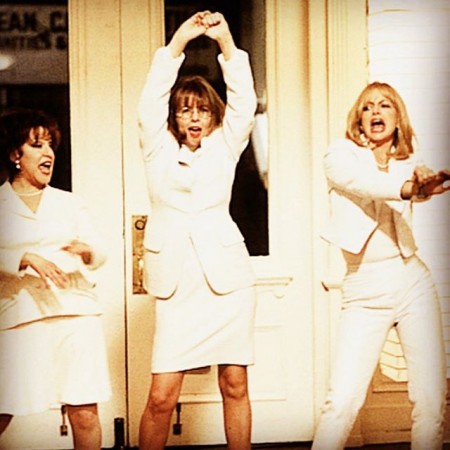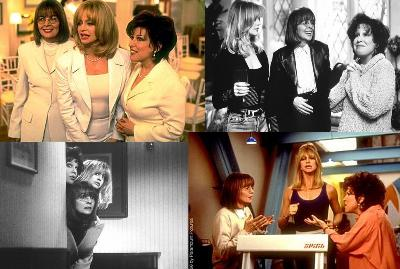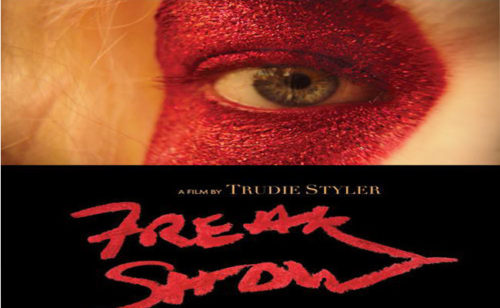Orange County Register
September 20, 1996
It may seem a tad peculiar that one of the year’s brighter comedies begins with a suicide, but that is just a tipoff to the deep sympathies that underlie the giddy humor of “First Wives Club. ”
Although in the end it makes a disappointing detour into not very funny revenge farce, for its first two-thirds, the movie is always funny and usually smart.
Not to mention being a dandy showcase for a trio of actresses who lately have been underused.
Foremost among them is Diane Keaton, who is something of a first among equals. It is her character, a divorced, wealthy New Yorker, who carries the movie’s moral burden. But that’s not to say she doesn’t get fine help from her co-stars. Goidie Hawn is delightfully
wacky as a movie star on the professional and romantic downslide while Bette Midler, though not at her best,”is amply comic as the tossed-aside helpmate of an appliance store magnate.
Although the present circumstances of this unlikely trio aré sharply divergent, they all were chums in college, along with a fourth friend, Cynthia Swann (Stockard Channing), now the newly ex-Mrs. Griffin. It’s Cynthia who opens the movie in an opulent New York apartment of the type inhabited by the superrich, where before having one last cocktail, she takes a dive off the balcony.
The three old classmates meet at the funeral, and although it takes a few tankards of alcohol before any of them admits to any unhappiness, we know from some pithy introductory scenes that each is in hard times. Keaton’s Annie MacDuggan Paradise is trying to maintain her WASP-ish cheerfulness rather than surrender to her despair over her recent separation from husband Aaron (Stephen Collins) anxiety over daughter Chris’ (Jennifer Dundas) assertive lesbianism and frustration over her mom’s (Eileen Heckart)
unceasing hectoring.
Hawn’s Elise Elliot Atchison has just come from a hilarious visit to her cosmetic surgeon where she’s demanded an injection-too- ”¢Â far of collagen into swollen lips, while Midler’s Brenda Morelli Cushman has just had a morale shredding encounter with her ex,
Morty (Dan Hedaya), and his current bimbo. Shelly (Sarah Jessica Parker), at a swanky dress shop.
In other words, all three women are about to be tossed aside (Elise also has a philandering husband, this one a producer who takes up with a would-be actress appropriately played by “Showgirls’ ” Elizabeth Berkley). But rather than give up, the three determine
to fight back. This trio, all of whom made crucial sacrifices that led to their faithless mates’ successes, will demand a big payback.
If this sounds like slapstick stuff, it often is, and pretty good slapstick at that. The three continually find themselves in awkward positions, with varying degrees of obliviousness. Hawn’s narcissistic Elise – the most consistent begetter of belly laughs – is particularly susceptible to head-turning” braise, whether in a lesbian bar-where, her initial wariness melts in the exaltation of a new group of fans, or careening down the side of a skyscraper in a window-washer’s trolley, pausing long enough to acknowledge another fan’s compliments.
Yet the movie also boasts a sound sense of characterization, one built on director Hugh Wilson‘s impressive use of his three stars’ stereotypical personalities.
Rather than ignoring or overplaying Keaton’s whitebread nervousness, Midler’s ethnic oomph or Hawn’s sexy silliness, Wilson has each actress play off her trademark personality.
Quickly established, these broad outlines are filled in with subtler, defter touches.
And these are characters who increasingly populate Wilson’s movies. A television veteran who broke into movies with probably the most disreputable comedy of the ’80s, “Police Academy,” Wilson has always favored the overlooked, the superannuated and the supernumerary as the subjects of his comedies (which include “WKRP” on TV and “Rustler’s Rhapsody” and “Guarding Tess” for the big screen). A taste for the occasional pratfall is accompanied by an understanding – not pity – for people who have discovered their main chance has slipped through their fingers without their knowing it was theirs to grasp. From mediummarket disc jockeys to a widowed first lady and a passeover Secret Service agent, down to these three “first wives,” Wilson sees a poignancy to people who have been treated with indifferent cruelty, the worst kind.
But mostly he relishes their redemption, and in “The First Wives Club,” that comes in a way that is rewarding but then drops to merely mechanical.
While the ostensible object of the three women is revenge on their husbands, what they’re really after, even if they don’t first realize it, is self-respect. When the movie shows them making this difficult, but always funny, discovery, it’s first-rate.
Unfortunately, they have this important epiphany long before the movie is over, apparently to clear the decks for their various triumphs over husbands and rivals.
It’s not that the various comeuppances aren’t funny; they frequently are. But nothing that happens in the final portion of the movie is as funny as what comes earlier. Worse, the sense of caring that made the movie not just funny, but compelling, dissipates in the obvious winding-up.
Still, there’s plenty of entertainment and humanity to be had iri “The First Wives Club.” It gives three talented actresses the kind of roles they deserve but seldom get. And it marks the forward progress of one of the most interesting, if less noted, filmmaking
careers in the heart of Hollywood.







